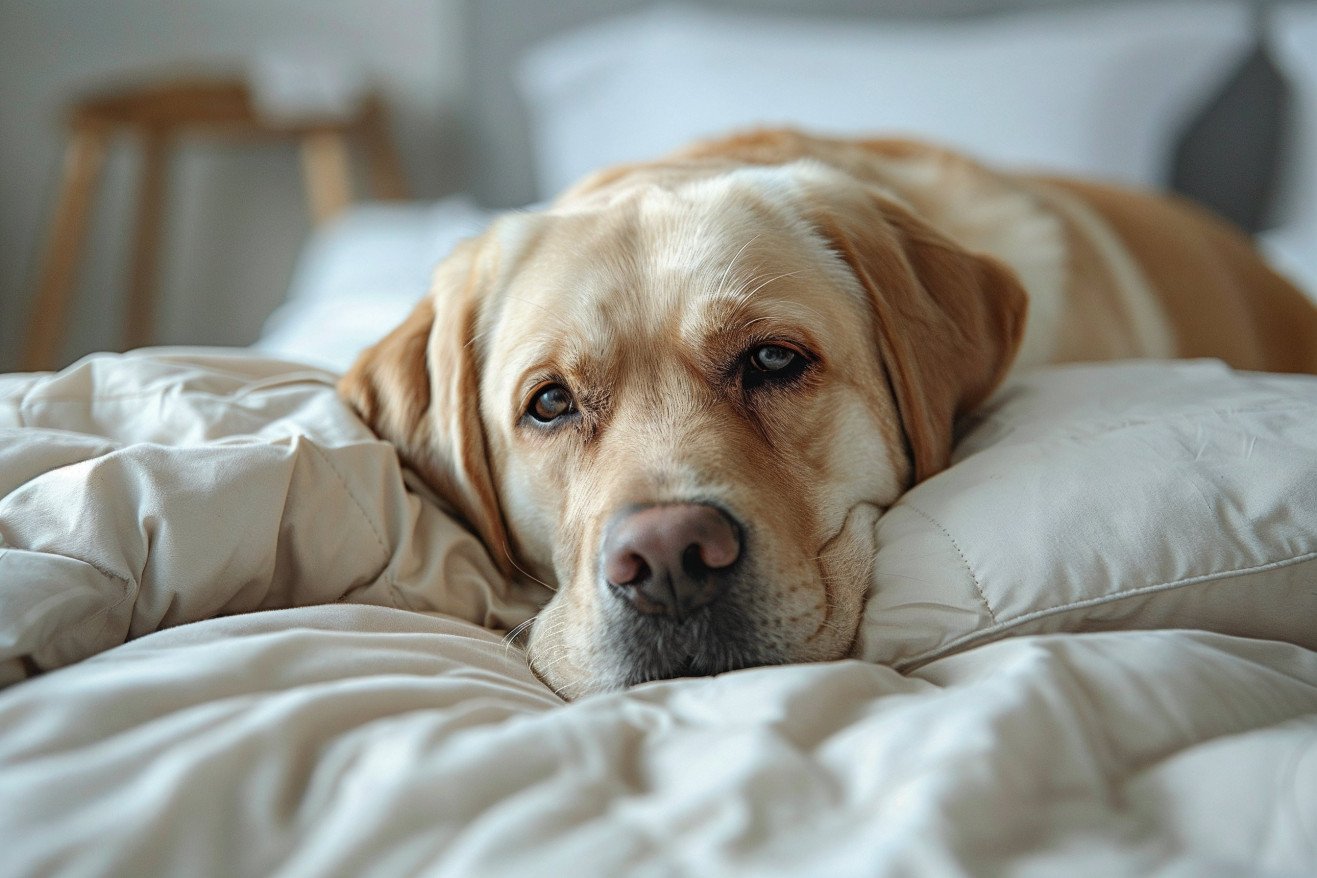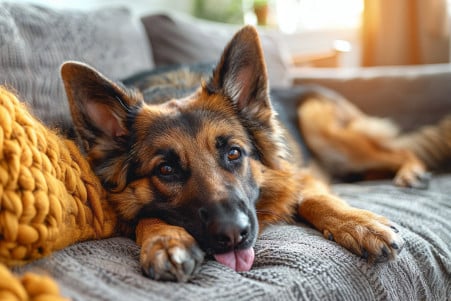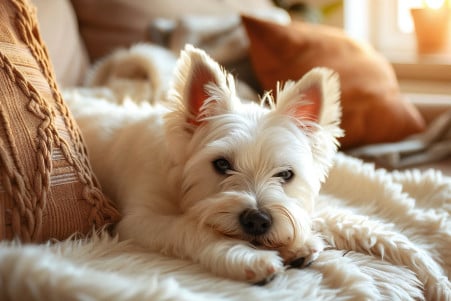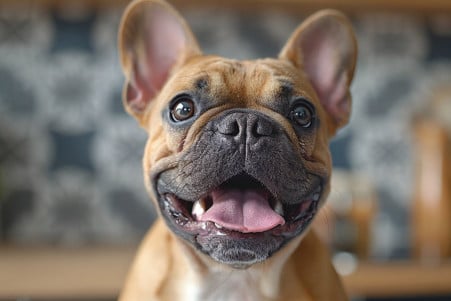Why Does My Dog Lick My Pillow? Exploring the Slobbery Reasons
30 May 2024 • Updated 29 May 2024

Have you ever found yourself asking why your dog is so interested in licking your pillow and leaving a trail of slobber behind? It turns out that dogs lick pillows and other fabrics because they are attracted to their owners' scent and licking the pillow helps them feel close to their human. Pillows also absorb sweat, skin cells, and oils from their owners, which dogs can smell due to their powerful sense of smell. When they lick the pillow, they are actively exploring and enjoying your scent.
Although pillows are often the target of a dog's licking, there are many other reasons why dogs engage in this behavior. In this article, we'll discuss the most recent studies by veterinary behaviorists, animal behaviorists, and researchers that have delved into the many reasons why dogs lick and what motivates them. By the end of this article, you'll have a better understanding of why your dog can't help but lick your pillow and you'll know how to address the behavior in a healthy way.
Why does my dog lick my pillow?
Potential Health Risks of Licking Pillows
While excessive, intense, or compulsive licking can be a sign of an underlying health problem, according to this article from the American Kennel Club, licking pillows excessively may be a sign of anxiety, stress, obsessive-compulsive disorder, digestive issues, or even dementia in older dogs.
If the behavior is new and consistent, it may be due to a temporary issue like nausea or a bad taste in the mouth, according to this expert response on JustAnswer.com. However, long-term excessive licking may be a sign of a more serious psychological issue due to stress, anxiety, or boredom, according to this article from ImpersonateMe.com.
It's important to differentiate between normal licking and problematic, excessive licking that may be a sign of an underlying health issue. If the licking is intense, aggressive, or if your dog seems to be in a "trance" while licking, it may be a sign of obsessive-compulsive behavior that requires professional help. If the excessive licking continues, it's a good idea to talk to your vet, who can assess the situation and make recommendations for treatment.
Training Methods That Work to Stop Pillow Licking
Positive reinforcement training and redirection methods can help stop pillow licking, as mentioned in this PetHelpful article. In particular, giving the dog other things to do, like toys or chews, can help redirect the dog's attention away from licking pillows. The article also recommends interrupting the licking with a firm 'No!' and showing disapproval, while making sure not to reward the dog by pulling away, to help stop the behavior.
On the other hand, praising and rewarding the dog for licking other toys instead of pillows can help encourage the right behavior, according to wikiHow. Making sure the dog gets enough exercise and mental stimulation can also help reduce anxiety and obsessive behaviors that lead to licking, according to The Native Pet.
With these positive reinforcement-based training methods, dog owners can help stop their dogs from licking pillows and other household items. That said, if the behavior continues or seems to be related to separation anxiety, it may be time to look into the matter further, which is discussed in the next section.
Separation Anxiety as a Cause of Pillow Licking
According to the Oakbrook Animal Hospital, some of the signs of separation anxiety in dogs include excessive licking, drooling, panting, barking, house soiling, and destructiveness. These are all ways that dogs can act out when they feel separation anxiety. In addition to these signs, some physiological signs of separation anxiety include sweaty paws, glazed eyes, panting, and pacing, as described in this article from When Hounds Fly.
It's important to note that these symptoms are different from those of boredom or other reasons for pillow licking. The Native Pet notes that a dog with separation anxiety may show signs of excessive licking, drooling, panting, barking, house soiling, and destructiveness. Treatment for separation anxiety may include behavior modification, positive reinforcement training, and in some cases, medication, which should be discussed with a vet.
The Role of Smell and Comfort in Pillow Licking
Dogs have an incredibly sensitive sense of smell, and this is one of the most important factors that draws them to pillows and bedding. As mentioned in Why Does My Dog Love to Lick My Pillow? Unpillow the Mystery!, pillows and fabrics absorb the scent of their owners, which makes them smell comforting and familiar to dogs. Pillow licking may be a form of self-soothing for dogs when they are stressed or need comfort, as the Hepper article suggests.
In addition to the scent of their owners, dogs may also be attracted to pillows and bedding because of their texture and warmth. According to PawSafe, dogs may find the soft, warm texture of pillows to be comforting and soothing. Offering other items that have familiar scents and textures can help dogs feel comforted and reduce the amount of time they spend licking pillows.
Recognizing the importance of a dog's sense of smell and their need for comfort in their attraction to pillows is important in addressing this behavior. By finding other ways to fulfill these needs, dog owners can help reduce the amount of time their dogs spend licking pillows and make sure their pets are happy.
Meeting Nutritional or Behavioral Needs
In some instances, dogs may lick pillows excessively to meet nutritional needs. For example, as noted in Why Does My Dog Lick Pillows? The Surprising Answer!, pillows can be salty due to sweat and skin cells, and dogs may lick them to get salt if they are not getting enough in their diet.
Meanwhile, obsessive-compulsive disorder (OCD) or other behavioral issues can lead to compulsive pillow licking, according to Why Does My Dog Lick My Pillow? Causes Explained. If a medical or behavioral cause is suspected, it's important to consult a veterinarian for a proper diagnosis and treatment plan, as noted by Oakbrook Animal Hospital.
By making sure that nutritional and behavioral issues are being addressed, dog owners can help stop their pets from licking pillows excessively. In many cases, working with a vet can help people identify the cause of their dog's pillow licking and develop a plan to address it.
Conclusion: Striking a Balance and Seeking Professional Help
Dogs have an incredible sense of smell, which is a big reason why they’re attracted to pillows and bedding. As outlined in Why Does My Dog Love to Lick My Pillow? Unpillow the Mystery!, pillows and fabrics absorb the scents of their owners, so when dogs lick them, they’re licking a scent that’s comforting and familiar. The Hepper article suggests that licking pillows may be a form of self-soothing for dogs when they’re stressed or anxious.
In addition to scent, dogs may be attracted to the texture and warmth of pillows and bedding. According to PawSafe, dogs may find the soft, cozy nature of pillows to be soothing and comforting. Offering alternative items that have familiar scents and textures may help dogs feel soothed and reduce their urge to lick pillows.
Recognizing the impact of a dog’s keen sense of smell and their need for comfort in their desire to lick pillows is important for addressing this behavior. By fulfilling these needs in other ways, dog owners can help reduce excessive pillow licking and ensure their pets are happy.


